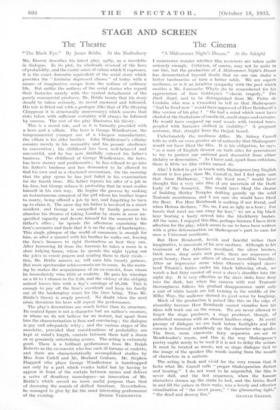STAGE AND SCREEN The Theatre
..,The Black Eye." By James Bridie. At the Shaftesbury Mn. BIOME describes his latest play, aptly, as a novelette in dialogue. In its plot, its wholesale reversal of the laws of probability, and the exotic sense of values which it expresses, it is the exact dramatic equivalent of the 'serial story which provides the " feminine depressed classes " of today with a means of imaginative escape from the tedium* of ordinary life. But unlike the authors of the serial stories who regard their fantasies merely with the cynical detachment of the purely commercial producer, Mr. Bridie insists that his story should be taken seriously, its moral mastered and followed. Hii tale is fitted out with a prologue (like that of The Sleeping Clergyman it is structurally unnecessary) which asserts that risks taken with sufficient certainty will always be followed by success. The rest. of the play illustrates his theery.
This is a moral tale, and so it is formally provided with a hero and a villain: The hero is George Windlestraw, the temperamental younger son of a Glasgow manufacturer, the villain is his elder brother. John Windlestraw's villainy consists merely in his normality and his prosaic obedience to convention ; his childhood has been well-behaved and uneventful, and he has now dutifully entered his father's business, The childhood of George Windlestraw, the hero, has been stormy and problematic ; he has refused to go into his father's business and has demanded to be allowed to find his own soul as a chartered accountant. On the morning that the play opens he has just failed in his examination for the fourth time. His father repeats his offer of a job in his firm, but George refuses it, protesting that he must realise himself in his own way. He begins the process by making an instantaneous conquest of the girl whom his brother hopes to marry, being offered a job by her, and forgetting to turn up to claim it. The same day his father is involved in a street accident, and George is compelled by family pressure to abandon his dreams of taking London by storm in some un- specified capacity and devote himself for the moment to his father's office ; he spends the afternoon examining the firm's accounts and finds that it is on the edge of bankruptcy. This single glimpse of the world. of commerce is enough for him, so after a quarrel with his brother he walks out, leaving the firm's finances to right themselves as best they can. After borrowing £3 from the foreman he takes a room in a slum lodging house, where he spends the night typing out the jokes in comic papers and sending them to their rivals— this, Mr. Bridle assures us, will earn him twenty guineas. But more spectacular achievements are to come. In the morn- ing he makes the acquaintance of an ex-convict, from whom he immediately wins £250 at roulette. He puts his winnings on a 83 to 1 chance in the 3.30, and the victory of the obliging animal leaves him with a day's earnings of £8,500. This is enough to pay off the firm's overdraft and keep his family out of the bankruptcy court for the time being.' Thus Mr. Bridle's theory is amply proved. No doubt when the next crisis threatens his hero will repeat the performance.
The play's decorations are much better than its structure. Its central figure is not a character but an author's creature, in whom we do not believe for an instant, but apart from him the characterisation is firm and convincing ; the dialogue is gay and adequately witty ; and the various stages of the novelette, provided that considerations of probability are kept at mind's length, contain between them half a dozen or so genuinely entertaining scenes. The acting is extremely good. There is a brilliant performance from Mr. ' Ralph Roberts as the ex-convict who has such ill fortune at roulette, and there are characteristically accomplished studies by Miss Jean Cadell and Mr. Morland Graham. Mr. Stephen Haggard who plays George Windlestraw is handicapped not only by a part which evades belief but by having to appear in front of the curtain between scenes and deliver a series of desultory monologues—an innovation of Mr. Bridie's which served no more useful purpose than that of drowning the sounds of shifted furniture. Nevertheless, he managed to give by far the most interesting performance


























































 Previous page
Previous page